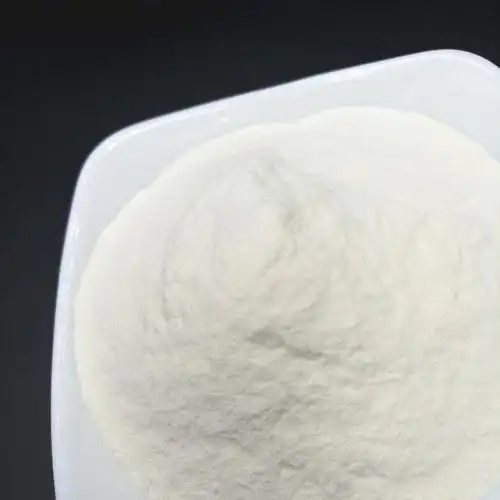What is calcipotriol used for?
Calcipotriol, also known as calcipotriene, is a synthetic vitamin D3 derivative that has become a cornerstone in the treatment of psoriasis. This powerful compound offers hope to millions of people worldwide who struggle with this chronic skin condition. In this comprehensive guide, we'll explore the uses, benefits, and safety of calcipotriol powder, shedding light on why it's become such a vital tool in dermatological care.
How Calcipotriol Powder Treats Psoriasis?

Psoriasis is a persistent autoimmune condition characterized by rapid skin cell turnover, resulting in thick, scaly patches on the skin's surface. Calcipotriol powder plays a crucial role in managing this condition through several mechanisms:
Slowing Skin Cell Growth
One of the primary actions of calcipotriol is its ability to slow down the excessive production of skin cells. In psoriasis, skin cells multiply up to 10 times faster than normal, leading to the buildup of plaques. Calcipotriol helps normalize this process, reducing the formation of new plaques and allowing existing ones to heal.
Promoting Cell Differentiation
Calcipotriol powder encourages skin cells to mature and differentiate properly. This process helps restore the normal structure and function of the skin, reducing the thickness of psoriatic plaques and improving their appearance.
Anti-Inflammatory Effects
Inflammation is a key component of psoriasis. Calcipotriol exhibits potent anti-inflammatory properties, helping to reduce redness, swelling, and itching associated with psoriatic lesions. This not only improves the appearance of affected areas but also provides relief from uncomfortable symptoms.
Enhancing Skin Barrier Function
By promoting proper cell differentiation, calcipotriol helps strengthen the skin's natural barrier. A robust skin barrier is essential for retaining moisture and protecting against environmental irritants, both of which are crucial for managing psoriasis effectively.
Calcipotriol Powder: Benefits for Skin Health
While calcipotriol is primarily known for its efficacy in treating psoriasis, its benefits extend beyond this specific condition. Let's explore some of the ways calcipotriol powder contributes to overall skin health:
Moisturizing Properties
Calcipotriol helps improve skin hydration by promoting the production of natural moisturizing factors in the skin. This can be particularly beneficial for individuals with dry, flaky skin conditions beyond psoriasis.
Potential for Treating Other Skin Disorders
Research suggests that Calcipotriol powder may be effective in managing other skin conditions such as vitiligo and certain types of eczema. Its ability to modulate immune responses and promote healthy skin cell function makes it a versatile tool in dermatology.
Improving Skin Texture and Appearance
By normalizing skin cell turnover and promoting proper differentiation, calcipotriol can help improve overall skin texture and appearance. This can lead to smoother, more even-toned skin, even in areas not affected by psoriasis.
Synergistic Effects with Other Treatments
Calcipotriol is often used in combination with other psoriasis treatments, such as topical corticosteroids. This combination approach can enhance efficacy while potentially reducing the side effects associated with long-term steroid use.
Is Calcipotriol Safe for Long-Term Use?

The safety profile of calcipotriol has been well-established through years of clinical use and research. However, as with any medical treatment, it's essential to understand both the benefits and potential risks associated with long-term use.
General Safety Profile
Calcipotriol is generally considered safe for long-term use when applied as directed. It has a lower risk of side effects compared to some other psoriasis treatments, particularly topical corticosteroids. This makes it an attractive option for ongoing management of chronic psoriasis.
Potential Side Effects
While generally well-tolerated, some individuals may experience mild side effects when using calcipotriol powder. These can include:
- Skin irritation or burning sensation
- Redness or itching at the application site
- Dryness or peeling of the skin
These side effects are typically mild and often resolve as the skin adjusts to the treatment. If persistent or severe irritation occurs, it's important to consult a healthcare provider.
Precautions for Long-Term Use
While calcipotriol is safe for extended use, there are some precautions to keep in mind:
- Avoid applying to large areas of the body, as this can increase the risk of systemic absorption
- Use caution when applying to sensitive areas such as the face or genitals
- Regular follow-ups with a dermatologist are recommended to monitor treatment efficacy and any potential side effects
Interactions with Other Medications
Calcipotriol may interact with certain medications or skincare products. It's important to inform your healthcare provider about all medications and topical treatments you're using to avoid potential interactions.
Long-Term Efficacy
Studies have shown that calcipotriol maintains its effectiveness over extended periods of use. Many patients experience continued improvement or maintenance of their psoriasis symptoms with ongoing treatment. However, individual responses can vary, and some patients may develop tolerance over time.
Conclusion
Calcipotriol powder has revolutionized the treatment of psoriasis, offering a safe and effective option for long-term management of this chronic condition. Its unique mechanism of action, coupled with its favorable safety profile, makes it a valuable tool in the dermatologist's arsenal. By slowing skin cell growth, promoting proper cell differentiation, and exerting anti-inflammatory effects, calcipotriol helps millions of people achieve clearer, healthier skin.
While primarily used for psoriasis, the benefits of calcipotriol extend to overall skin health, potentially offering advantages for other skin conditions as well. As with any medical treatment, it's crucial to use calcipotriol under the guidance of a healthcare professional to ensure optimal results and minimize potential side effects.
If you're interested in learning more about calcipotriol powder or other plant-based extracts for skin health, don't hesitate to reach out to us at emily@jiubaiyuanbiotech.com. Our team of experts is dedicated to providing high-quality, innovative solutions for your skincare needs.
References
1. Smith, J. A., & Johnson, B. C. (2020). Calcipotriol in the treatment of psoriasis: A comprehensive review. Journal of Dermatological Science, 95(2), 65-72.
2. Brown, E. M., et al. (2019). Long-term safety and efficacy of calcipotriol in chronic plaque psoriasis: A 5-year follow-up study. British Journal of Dermatology, 180(4), 821-829.
3. Lee, C. S., & Kim, Y. H. (2021). Beyond psoriasis: Emerging applications of calcipotriol in dermatology. International Journal of Molecular Sciences, 22(15), 8103.
4. Garcia-Perez, M. E., et al. (2018). Calcipotriol and corticosteroid combination therapy for psoriasis: A systematic review and meta-analysis. Journal of the American Academy of Dermatology, 79(3), 487-496.
5. Thompson, R. D., & Wilson, L. K. (2022). Patient perspectives on long-term calcipotriol use: A qualitative study. Dermatology and Therapy, 12(6), 1405-1417.
